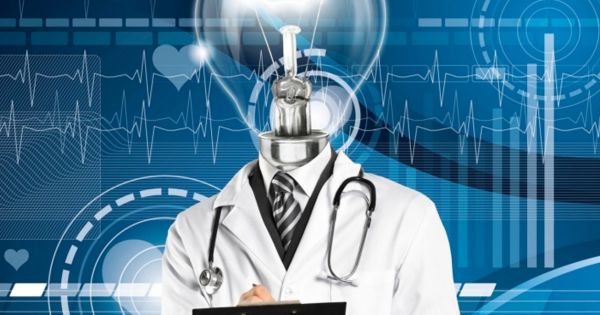Source-geneticliteracyproject.org
To understand the benefits that artificial intelligence can bring to the world of human medicine, consider the case of Ayako Yamashita, a 60-year-old Japanese woman, whose condition befuddled doctors in 2015.
Yamashita was thought to be suffering from acute myeloid leukemia. But after several unsuccessful treatment attempts, her doctors decided to search for another answer to her condition. They turned to IBM’s Watson, an AI system capable of analyzing vast amounts of data.
The computer reviewed nearly 20 million previously-published oncological research studies and cross-referenced data points. Watson’s analysis suggested the woman had a rare form of leukemia not detected through conventional methods. This led to a change in treatment and doctors crediting Watson for saving the woman’s life.
The analysis of such huge amount of data is next to impossible for a human mind, but it’s like a walk in a digital park for AI. And it shows what may be one of the valuable things that AI can do for us. It is “the most practical application in the field of medical and healthcare for artificial intelligence,” said Seiji Yamada, of the National Institute of Informatics and chairman of the Japanese Society for Artificial Intelligence.
The global artificial intelligence market is expected to reach $19.47 billion by 2022, according to the research firm Allied Market Research. As AI is marking its presence, tech giants are working to capitalize on new opportunities. The healthcare sector is a natural fit, according to Sanjay Gupta, managing director, South Asia and Middle East for NICE, a technology firm based in Israel, in an interview with ETHealthworld:
“The development of automation enabled by technologies including robotics and artificial intelligence in healthcare sector brings the promise of higher productivity with increased safety.”
Saving lives and time
Among Google’s many AI ventures is an effort to develop new products targeting the health sector. The company is focusing on applications for life preservation, preventive care and improving health care services.
The company plans to launch a trial in India to test an AI system that scans a person’s eyes to look for signs of diabetic retinopathy. The company aims to license the technology to clinics. The system already has proven itself adept at detecting high blood pressure, or risk of heart disease or stroke, according to a study published in early 2018.
From a story published in the Washington Post:
“This may be a rapid way for people to screen for risk,” Harlan Krumholz, a cardiologist at Yale University who was not involved in the study, wrote in an email. “Diagnosis is about to get turbo-charged by technology. And one avenue is to empower people with rapid ways to get useful information about their health.”
Jeff Dean, the Chief at Google AI, outlined for Boss Magazine how this system will enable doctors to better diagnose and treat patients for a range of diseases. Moreover, this system will also track key events in the patient’s past (including hospital stays) to help doctors more effectively.
Improving service
Health care facilities are transforming themselves with the addition of AI to improve quality of service and patient experience. The Geisinger Health System has incorporated the Cognitive Clinical Success Machine, developed by Jvion. It’s designed to reduce avoidable readmissions associated with chronic obstructive pulmonary disease (COPD). Karen Murphy, executive vice president at Geisinger, said in an interview with Healthcare IT News that the system would improve outcomes, quality and patient experience.
The system asks nearly 50 questions regarding the health of a patient and how it can be changed. With each question, the system delivers an assessment of risks involved with each patient. Then it provides insights into the most efficient actions and interventions that can be taken to improve patient’s health.
Enhanced end-of-life care
Providing the right care at the end-of-life is essential to avoid painful experiences for patients. Moreover, excess care would result in piled up bills even though they are covered under insurance. AI advancements could be of great help to patients with an age of 65 years or older. According to the recent study published in the journal NPJ Digital Medicine, Researchers implemented AI to screen electronic health records along with notes taken by doctors for finding potential health risks. This included nearly 48 billion data points used in a deep learning model.
The AI analyzed the data and determined medical issues such as mortality rates, unplanned readmission and long hospital stays with an accuracy of 90 percent. In comparison to traditional predictive analysis models, the deep learning model provided 10 percent more accuracy and scalability. The system did not only analyze electronic records, but also took into account doctors’ notes and information on old charts stores as PDF files.
Saving money
Along with providing better services, AI can also help cut costs. The startup Optellum is working to commercialize an AI system that helps diagnose cancer through analysis of clumps of cells detected in scans. This system has shown success in early testing. The results suggest it could be capable of diagnosing nearly 4,000 lung cancer patients each year.
In an interview with Futurism, Timor Kadir, Chief Science & Technology Officer at Optellum, said the system could reduce costs in the healthcare industry by $13.5 billion if the US and Europe decide to use it. Moreover, Sir John Bell, chair of the UK’s Office for Strategic Coordination of Health Research, said: “There is about $2.97 billion spent on pathology services in the National Health Service. You may be able to reduce that by 50 percent.”
